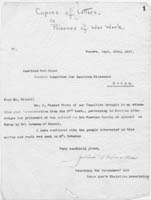Table of Contents
Appendix 12a
Julius F. Hecker Correspondence
September-November 1917
 Dr. Julius F. Hecker served as an American War Prisoners' Aid Secretary in Austria-Hungary, working in prison camps in Upper Austria
and Lower Austria. He was born in Russia and immigrated to the United States, where he directed the Methodist Church Mission for Russians
in New York City before the war. Hecker's fluency in Russian made him an ideal candidate to work with Russian prisoners of war. In April
1917, when relations between the United States and Austria-Hungary became strained, Hecker volunteered to remain in the Dual Monarchy to
support WPA relief work. The YMCA instead transferred Hecker to Geneva to work with the World's Alliance to collect or print Russian
books for distribution to POW's in German and Austro-Hungarian prison camps. The Association had a very difficult time obtaining books
printed in Russian, especially since there were no large stocks of this material in the Central Power countries in the pre-war period.
Hecker's job in Geneva was to transfer books shipped by welfare agencies in Russia to Austro-German prison camps or to order book
publishers to print Russian text books.1
Dr. Julius F. Hecker served as an American War Prisoners' Aid Secretary in Austria-Hungary, working in prison camps in Upper Austria
and Lower Austria. He was born in Russia and immigrated to the United States, where he directed the Methodist Church Mission for Russians
in New York City before the war. Hecker's fluency in Russian made him an ideal candidate to work with Russian prisoners of war. In April
1917, when relations between the United States and Austria-Hungary became strained, Hecker volunteered to remain in the Dual Monarchy to
support WPA relief work. The YMCA instead transferred Hecker to Geneva to work with the World's Alliance to collect or print Russian
books for distribution to POW's in German and Austro-Hungarian prison camps. The Association had a very difficult time obtaining books
printed in Russian, especially since there were no large stocks of this material in the Central Power countries in the pre-war period.
Hecker's job in Geneva was to transfer books shipped by welfare agencies in Russia to Austro-German prison camps or to order book
publishers to print Russian text books.1
This collection of correspondence reflects Hecker's duties as a World's Alliance secretary in Geneva in late 1917 and is composed of copies of the letters he sent. Russian letters were not included in this sample, but Hecker's English, French, and German correspondence is provided (he was fluent in a number of languages). In this selection, Hecker orders books from publishing companies; provides shipping information to WPA Senior Secretaries in Berlin, Vienna, and Sofia; and gathers information for books he is writing for the benefit of Russian prisoners. This work was made even more difficult by censorship requirements imposed by the belligerent nations and the transportation problems associated with the shipment of large numbers of books. This work, however, was extremely important for Russian POW's languishing behind barbed-wire, waiting for the arrival of a new set of books to help them pass their time.
Notes:
Note 1: Armed Services Box-54, Folder: Prisoner of War Work-Dr. J. F. Hecker, 1917, Kautz Family YMCA Archives, University of Minnesota, Minneapolis, MN.